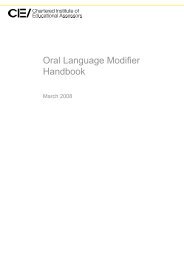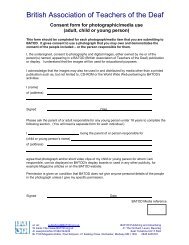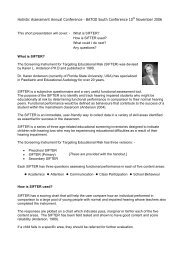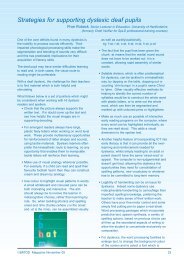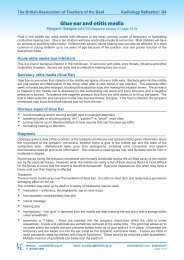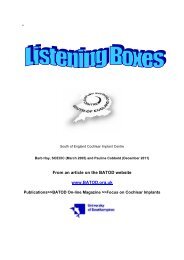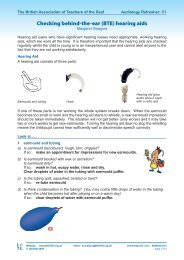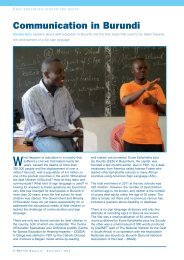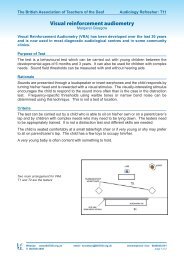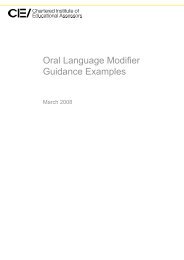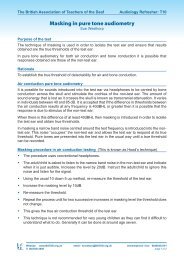Goal fulfilment in school for the deaf and hearing impaired - batod
Goal fulfilment in school for the deaf and hearing impaired - batod
Goal fulfilment in school for the deaf and hearing impaired - batod
- No tags were found...
You also want an ePaper? Increase the reach of your titles
YUMPU automatically turns print PDFs into web optimized ePapers that Google loves.
Appendice I1II. Compulsory School (from www.skolverket.se)Compulsory <strong>school</strong> lasts <strong>for</strong> 9 <strong>school</strong> years. Each<strong>school</strong> year consists of an autumn term <strong>and</strong> aspr<strong>in</strong>g term.Compulsory <strong>school</strong> is n<strong>in</strong>e years of m<strong>and</strong>atory<strong>school</strong><strong>in</strong>g. Children who are unable to attendregular compulsory <strong>school</strong> can attend <strong>the</strong> special<strong>school</strong> <strong>for</strong> <strong>the</strong> <strong>deaf</strong> <strong>and</strong> hear<strong>in</strong>g-<strong>impaired</strong> orcompulsory <strong>school</strong> <strong>for</strong> children with learn<strong>in</strong>gdisabilities.Who attends compulsory <strong>school</strong>?Compulsory <strong>school</strong> is m<strong>and</strong>atory <strong>and</strong> is open toall children aged 7-16.How is <strong>the</strong> <strong>school</strong> organised?The vast majority of <strong>school</strong>s <strong>in</strong> Sweden aremunicipally-run, which means that <strong>the</strong>municipality is <strong>the</strong> pr<strong>in</strong>cipal.The usual th<strong>in</strong>g is <strong>for</strong> children to attend amunicipal <strong>school</strong> close to <strong>the</strong>ir homes. However,<strong>the</strong> pupils <strong>and</strong> <strong>the</strong>ir parents are entitled to chooseano<strong>the</strong>r municipal <strong>school</strong>, or a <strong>school</strong> that is run<strong>in</strong>dependently.Independent <strong>school</strong>s are open to all children<strong>and</strong> must have been approved by <strong>the</strong> NationalAgency <strong>for</strong> Education. Teach<strong>in</strong>g <strong>in</strong> <strong>in</strong>dependent<strong>school</strong>s is to have more or less <strong>the</strong> sameobjectives as those of <strong>the</strong> municipal <strong>school</strong>, butcan have an orientation that differs from thatof <strong>the</strong> municipal <strong>school</strong>s. If <strong>the</strong> <strong>school</strong> does notcomply with current regulations, <strong>the</strong> NationalAgency <strong>for</strong> Education can withdraw its permit.It is common <strong>for</strong> <strong>in</strong>dependent <strong>school</strong>s to havea different orientation from municipal <strong>school</strong>s,<strong>in</strong>clud<strong>in</strong>g special teach<strong>in</strong>g methods (Montessorior Waldorf), a l<strong>in</strong>guistic/ethnic orientation, or tobe <strong>school</strong>s with a certa<strong>in</strong> religious profile.Personal progress reviewEach term throughout compulsory <strong>school</strong>, <strong>the</strong>teacher is to have a personal progress reviewtalk with <strong>the</strong> pupil <strong>and</strong> <strong>the</strong> pupil’s guardian(s).This is to <strong>in</strong>volve a discussion of how <strong>the</strong> pupil’sknowledge acquisition <strong>and</strong> social developmentare best supported. The <strong>in</strong><strong>for</strong>mation shouldbe based on an evaluation of <strong>the</strong> pupil’sdevelopment <strong>in</strong> relation to <strong>the</strong> goals of <strong>the</strong> syllabi<strong>and</strong> should clarify what measures are necessary<strong>for</strong> <strong>the</strong> pupil to achieve <strong>the</strong> goals. At <strong>the</strong> requestof <strong>the</strong> pupil’s guardian(s), <strong>the</strong> teacher is toprovide written <strong>in</strong><strong>for</strong>mation about <strong>the</strong> pupil’sprogress at <strong>school</strong> to supplement <strong>the</strong> progressreview. This must not be of <strong>the</strong> nature of a grade.What rules govern compulsory <strong>school</strong>?A national curriculum describes <strong>the</strong> <strong>school</strong>’svalue base <strong>and</strong> basic goals <strong>and</strong> guidel<strong>in</strong>es. Theseare common to <strong>the</strong> compulsory comprehensive<strong>school</strong>, <strong>the</strong> Sami <strong>school</strong>, compulsory <strong>school</strong> <strong>for</strong>children with learn<strong>in</strong>g disabilities <strong>and</strong> <strong>the</strong> <strong>school</strong><strong>for</strong> <strong>the</strong> <strong>deaf</strong> <strong>and</strong> hear<strong>in</strong>g-<strong>impaired</strong>.A national syllabus <strong>for</strong> each <strong>in</strong>dividual subject.A national time schedule which states <strong>the</strong>m<strong>in</strong>imum guaranteed time that pupils areentitled to teacher-led <strong>in</strong>struction <strong>in</strong> <strong>the</strong> varioussubjects.A municipal <strong>school</strong> plan that shows how <strong>the</strong>municipality’s <strong>school</strong>s are to be organised <strong>and</strong>developed.A local work plan <strong>for</strong> each <strong>school</strong>, which isan adaptation of <strong>the</strong> contents of <strong>the</strong> nationalcurriculum, <strong>the</strong> syllabi <strong>and</strong> <strong>the</strong> <strong>school</strong> planto <strong>the</strong> organisation, work methods <strong>and</strong> localcircumstances of that <strong>school</strong>.68 <strong>Goal</strong> <strong>fulfilment</strong> <strong>in</strong> <strong>school</strong> <strong>for</strong> <strong>the</strong> <strong>deaf</strong> <strong>and</strong> hear<strong>in</strong>g <strong>impaired</strong>



